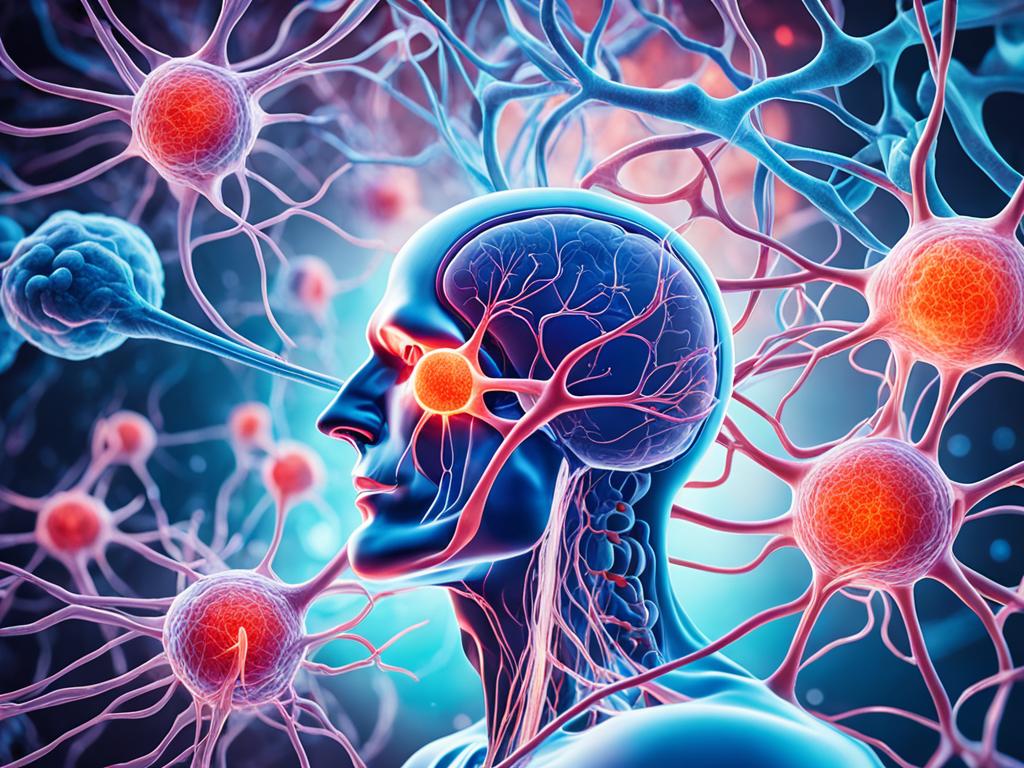Why Is Sex So Important to Men? Biological and Psychological Perspectives
Sex has intrigued researchers for centuries across different fields1. From Alfred Kinsey’s extensive interviews to the study of genes and society’s impact, everything adds to our knowledge1. This article will explore the biological and psychological elements that make sex crucial for men.
We will start by looking at sex as a basic biological need. We’ll see how hormones, brain differences, and evolution shape male sexual desire. Then, we’ll talk about what sex means for men emotionally, touching on self-worth, closeness, and feeling safe. We’ll use the latest studies and cultural views to get a full picture of male sexuality2.
Let’s dive deep into why sex is so critical for men. We will explore the complex mix of biology, psychology, and cultural factors that influence male sexuality132.
Sex as a Biological Drive
Men’s sexual desires are closely tied to their biology, especially high testosterone levels. This hormone is key in driving their urge for sex both physically and emotionally4. It accounts for things like sudden erections and a constant thirst for sexual experiences4.
The Role of Testosterone
Testosterone floods the male body, igniting their sexual needs and actions4. Even small things like a quick glimpse of their partner after a shower can cause arousal4. This desire is often compared to hunger for chocolate, full of surprise and joy4.
Sex’s release in men feels like coming back to a place of love after a hard day. It helps them feel deeply connected and generous in their relationships4. This emotional bond during sex makes men feel secure to share their feelings4.
Physical Manifestations of Sexual Desire
The physical signs of male sexuality are unique, from a more direct path to desire. Women, on the other hand, often seek intimacy and love in sexual acts5. Oxytocin from orgasms makes men feel more loved and connected, helping women find fulfillment5.
Male sexuality’s biological foundations greatly influence their thoughts and actions on sex. Studies show men often think more about sex, have more fantasies, and are quicker to get aroused6. They also desire sex more often and are more likely to start it6. These findings highlight the specific ways men navigate their sexual lives.
Learning the biology behind male sexual behavior offers deep insight into sexuality’s complexities. It shows how gender influences our intimate lives6.
| Biological Factor | Impact on Male Sexuality |
|---|---|
| Testosterone | Fuels sexual urges, drives physical and psychological manifestations of desire |
| Oxytocin | Triggers feelings of connectedness and love after sexual release |
| Dopamine and Norepinephrine | Increase during the Attraction stage, leading to pleasurable feelings about a partner |
| Vasopressin | Promotes feelings of calm and comfort in the Attachment stage of relationships |
Sex as a Psychological Need
Sex goes beyond just biology for men. It’s a key part in satisfying their psychological needs like feeling good about themselves, having freedom, and connecting with others7. For many men, the want for sex is strong. They see it as a way to increase their self-worth and grow closer to their partners8. Yet, this drive for sex can sometimes make them do unhealthy things. Mixing emotional and psychological needs with sex can really change how they see themselves and their relationships8.
Meeting Fundamental Psychological Needs
Experts have found that four key psychological needs are crucial for our well-being: feeling safe, liking ourselves, having freedom, and being part of a group7. While choosing not to have sex is not harmful9, being cut off from others is worse for our health than drinking too much or smoking9. This shows how important it is to meet these needs, especially the need to connect8.
Sex as a Strategy for Esteem and Connection
Men and women search for different things in sex. Women are often after a sense of safety and connection. Meanwhile, men often use sex to feel better about themselves8. There are biological reasons behind this. Hormones like oxytocin and processes like forming emotional bonds push us to seek esteem and connection through sex8.
But, relying on sex to meet these needs can backfire. It involves a mix of emotions and thoughts that can impact how we see ourselves and others. It’s key to understand these connections between our biology and how we feel in order to have healthy relationships978.
why is sex so important to men
Sex plays a huge role in a man’s life. It’s key to how many men see themselves as men. This happens mainly through sexual intercourse10. The need for sex and to feel wanted is very important for a man’s well-being and confidence10.
A lot of men, about 75%, have a sudden interest in sex. The other 25% find they want sex more in certain situations11. This strong desire for sex often makes sex very important in their relationships10. But for women, sexuality doesn’t revolve only around sex. They have other ways to express it, like having children and nursing10.
Sex holds a deep meaning for men beyond pleasure. It’s closely tied to their sense of self and feeling like they’re really men10. And when they go without sex, it can make them feel upset or look for it elsewhere10. A satisfying sex life is crucial for a man’s joy and his relationships12.
In the end, sex for men is influenced by many biological, mental, and social factors. Men and their partners can improve their relationship by understanding these elements101112.
Sex and Male Sexuality
For lots of men, sex is more than just a physical action. It’s a big part of who they are and how they feel overall. Men often feel a strong physical “hunger” for sex13. They also feel a lot of energy and excitement towards it. These feelings affect how they see, act, and think about sex. For them, trying new sexual things and finding fulfillment in sex is key.
Sex as a Physical Hunger
Men often describe their sexual desire as a deep need that must be satisfied13. Studies show that men think about sex daily far more than women do13. This deep need can lead to them looking for new sexual experiences or making sex a big priority in their lives.
Sex as Energy and Excitement
Sex isn’t just a need but a key source of excitement and energy for many men13. It brings anticipation, thrill, and vitality. This excitement drives them to seek out sex and affects their attitudes and actions around their sexuality14. Yet, they may end up putting sex second to other things like work and family, especially as they get older14. If they don’t get the sexual satisfaction they need, it can bring problems like anxiety and dissatisfaction in their relationships14.
There’s a big link between men’s need for sex, both physically and emotionally, and their sexuality13. Addressing these needs can really change their relationships and their life’s quality131415.
The Biological Basis of Male Sexual Behavior
Exploring male sexuality requires a look at how biology shapes it. Male sexual behavior involves hormones, the brain, and more. These factors mold every aspect of male sexuality, from physical to psychological traits.
Testosterone is vital for male sexual behavior16. It makes men typically like features like dark nipples and medium-sized breasts16. Also, men often prefer women with a low waist-to-hip ratio. A ratio of 0.70 is especially attractive in Western societies, thanks to testosterone’s effects16.
The brain’s role in male sexual behavior is fascinating as well. Damage to the medial preoptic area can stop a male rat from mating17. Structures like the amygdala and nucleus accumbens are key for wanting sex in animals17. Problems with the hypothalamus can lead to low sex drive17. This shows how crucial our brain’s hormones are for male sexuality.

Testosterone varies across the day and a man’s life18. It’s highest in the morning and at peak during late teens18. These changes affect a man’s sexual wants and actions greatly.
The biological foundation of male sexuality is complex and rich. Knowing the science behind male sexual behavior gives us insight into why it is so varied and unique161817.
Sex Differences in the Brain
Studies have shown that men and women’s brains are different19. Brain scans of more than 2,000 people were looked at. They found that some parts were bigger in women, while others were bigger in men19.
These studies involved nearly 2,000 adults. They showed that women usually have bigger prefrontal and superior temporal cortexes. Men, on the other hand, have larger ventral temporal and occipital regions19.
How these brain areas are shaped seems to link to genetic differences. These differences come from chromosomes. They might explain why men and women think and act differently when it comes to sex19.
Neuroanatomical Differences
Researchers have found differences in how male and female brains work20. A special computer program could tell the sex of the person from brain scans with 90% accuracy20. This study was published in an important science journal20. It showed that this new program worked better than older methods, using a type of artificial intelligence20.
About 1,500 brain scans were used to test this new program. It was almost always right in telling the scans apart. This shows that male and female brains do work in different ways20.
Brain Plasticity and Distributed Networks
The brain is known for being able to change and adapt. This happens in the networks that control different male and female behaviors and thinking abilities21. A study in 2014 showed a lot of interest in the connections between parts of the brain. 87 news articles and 162 blog discussions happened just in the first month after the study was released21.
When looking at brain sizes, most were pretty similar between men and women. This is like how tall men and women can be differently. But, when looking at brain skills, there were a lot of similarities between men and women. This is especially true for thinking about shapes in 3D, where most people are about the same21.
These studies bring out the complicated relationship between our brains and how we think and behave as men and women20. The success of the AI model shows that we can see these brain differences clearly. Now, we can better understand how the brain works differently in men and women20. The model found key brain areas important in telling the scans apart. And, it could even predict how well men and women would do on different brain tasks20. The team wants this new tool to help other researchers understand more about brain connections and thinking skills20.
In summary, these studies give us new and important insights into why men and women think and act the way they do. They help us understand more about the brain’s role in shaping our behavior and sexuality192021.
The Role of Hormones
Prenatal Hormone Exposure
Hormones like testosterone are key in making males who they are22. Another hormone, estradiol, keeps men’s bodies strong and their emotions steady. It also helps with how the body turns food into energy and helps the heart stay healthy22. But, too much estrogen in men can cause problems like swelling of the breast, trouble keeping an erection, or not being able to have kids22.
In the body, a type of protein changes testosterone into estradiol. This protein, aromatase, is found in different parts of the body. It is in the brain, the testicles, and even in fat tissue22. Some research suggests that estradiol can help protect against diseases that hurt the brain, like Parkinson’s and Alzheimer’s22. Men need a bit of this hormone to keep their belly fat low and their heart healthy22.
The hormones we get before we’re born can affect how we think and feel about sex as men23. Men who are in love have less testosterone in their blood. This helps love hormones do their work23. But, too much testosterone at first might make love hard23. Talking, knowing yourself, being patient, and asking experts for advice are important at the start of any relationship23.
For male animals like monkeys, testosterone makes them want sex24. Taking away this hormone makes men and male animals less interested in sex24. Just the smell of a woman who can have a baby can make a man’s testosterone jump. This makes him more interested in sex24. Men with more than one lover have more testosterone than those with just one24. Without enough testosterone, men can have trouble having sex, wanting sex, or getting ready for sex24.
| Hormone | Role in Male Sexuality |
|---|---|
| Testosterone | |
| Estradiol |
|
| Oxytocin |
|
To wrap up, testosterone and estradiol are big players in male development and sexuality. The hormones men get before birth impact their sexual behavior and thinking222324. It’s crucial we understand these hormones to know the various aspects of male sexuality better222324.
Sex Differences in Behavior and Cognition
Researchers have found that men and women see and do things differently, from how they act to how they think25. Differences appear due to the presence of various hormones before and after birth. These hormones shape how males and females behave sexually. They also affect the brain’s structure and how it works later on25.
For example, women usually perform better in tasks needing verbal memory. In contrast, men do well in tasks that require good spatial skills26. This means men might find their way better in a new area, while women might remember what they’re told better. However, both men and women do similarly in most working memory tasks26.
When it comes to remembering things for a long time, women tend to be better at remembering words. On the other hand, men often do better when they have to remember complex pictures or arrangements26. But, women seem to have the upper hand when the memory task involves both words and pictures26.
Executive Functions and Processing Speed
Men usually find it easier to change their focus from one thing to another. Women, though, are often more accurate in paying attention, especially when looking at faces, from the ages of 8 to 2126. Studies have shown that women are also quicker at processing information. This was found in a large group of people of all ages26.
These findings and the ongoing research point to a mix of genes, body changes, and the world we live in. This mix really shapes how men and women understand and interact with their environment25.
| Measure | Sex Difference | Sample Size | Source |
|---|---|---|---|
| Spatial abilities | 26% advantage for males | Meta-analysis | 27 |
| Adult brain structure | 56 participants | UK Biobank study | 27 |
| Mental rotation test | 3,367 participants | Cross-cultural study | 27 |
| Executive functions and cycle phase | 403 participants | Study on dopamine and cycle | 27 |
| Adult brain structure | 5,216 participants | UK Biobank study | 27 |
| Attention and menstrual cycle | 38 participants | Study on sex and cycle | 27 |
| Empathy, brain, and behavior | 46 participants | Study on gender effects | 27 |
| Language, control, and cycle | 27 participants | Study on cycle influences | 27 |
| Functional asymmetries and steroids | 6 participants | Study on steroid fluctuations | 27 |
| Spatial abilities and cycle | 235 participants | Study on hormone effects | 27 |
The table above outlines critical differences in how men and women think and behave. With the sample sizes and study sources mentioned, it highlights the complex nature of this field. More study is needed to fully grasp the influences on our cognitive and behavioral differences.
Sex, Gender, and the Environment
Our understanding of sex and its importance for men goes further than just biology and the mind. It includes the cultural environment and gender roles people find themselves in28. Most of us share 99.9% of our genes, showing how alike we are. But social expectations around gender can heavily influence how someone views sex.
In many places, being a sexually confident male has been highly valued. Men are often expected to be dominant and powerful in their sexual relationships29. Studies show there are some biological differences between sexes. These can shape how we act. But, the constant media image of men wanting to “conquer” in sex can be damaging. It sets up wrong ideals about men and sex.
The burdens of caring roles, often held by women, can hurt their health. It may even lead to heart problems28. This unequal sharing of home duties can also bring more poverty to women. They are often worse off financially, no matter where you look28.
Understanding sex and gender is key for men wanting a healthy view of their sex life. By questioning strict gender roles, we aim for more inclusive societies. These would support everyone in choosing their desires and identities, with self-assurance and kindness.
| Key Findings | Significance |
|---|---|
| Significant differences between males and females exist in terms of health and health outcomes28. | Highlights the need to consider gender-specific factors in healthcare and research. |
| Women are over-represented among poor households in nearly all societies, contributing to the feminization of poverty28. | Emphasizes the intersectionality of gender and socioeconomic status, and the importance of addressing systemic inequalities. |
| The stresses associated with caregiving, particularly for ill spouses, have been linked to adverse health outcomes, such as cardiovascular disease28. | Underscores the impact of gender roles and the need for support and resources for caregivers, regardless of gender. |
| Sex differences in immune function exist due to the fact that women and men face different immune challenges, particularly related to reproduction28. | Highlights the importance of considering biological sex differences in the study and treatment of immune-related conditions. |
To sum up, the surroundings and gender beliefs we grow up with shape how men see and live their sexuality. Being aware of these influences can push us to make a more welcoming world. One that encourages everyone to be true to their wants and sense of self, with confidence and care283029.
Conclusion
We’ve looked deeply into how sex affects men’s lives. It’s a mix of nature, mind, and culture. Exploring men’s sexual desires, we found they’re driven by both biologic needs and emotional wants. Sex is about more than just feeling good; it’s also about finding connection, feeling valued, and being filled with energy31.
Sex is not only fun but also good for health. It can help the heart, boost the immune system, and keep hormones balanced3132. We also talked about how men’s brains are different. Neuroanatomy and hormones play a big part in men’s sexuality33.
To help men build healthy and happy sexual lives, we need to understand these factors. Recognizing the complex nature of sex for men is crucial. It allows us to meet their needs and face challenges. It’s important for creating spaces where men can freely explore and enjoy their sexuality.
Source Links
- https://nobaproject.com/modules/the-psychology-of-human-sexuality
- https://www.oxfordbibliographies.com/abstract/document/obo-9780199828340/obo-9780199828340-0054.xml
- https://courses.lumenlearning.com/suny-socialproblems/chapter/4-1-understanding-sex-and-gender/
- https://www.psychologytoday.com/us/blog/married-and-still-doing-it/201708/6-truths-about-men-and-sex
- https://drsonjabenson.com/what-women-dont-know-about-men-and-sex-that-destroys-the-intimacy-they-desire/
- https://psychcentral.com/blog/the-difference-between-sex-and-love-for-men
- https://hupcfl.com/why-sex-is-related-to-psychological-needs/
- https://medium.com/@markmanson/sex-and-our-psychological-needs-e5d79cddbd89
- https://markmanson.net/sex-and-our-psychological-needs
- https://www.familylife.com/articles/topics/marriage/marriage-challenges/understanding-differences/why-sex-is-so-important-to-your-husband/
- https://www.menshealth.com/sex-women/a43432474/how-important-is-sex-in-relationships/
- https://medium.com/illumination/men-how-important-is-sex-to-you-eb52709fe9c5
- https://www.webmd.com/sex-relationships/ss/secrets-guys-wish-you-knew
- https://www.today.com/health/men-sex-relationships-therapist-shares-surprising-truths-about-desire-t149064
- https://www.massgeneralbrigham.org/en/about/newsroom/articles/sexual-health-for-men
- https://en.wikipedia.org/wiki/Human_male_sexuality
- https://courses.lumenlearning.com/atd-herkimer-intropsych/chapter/sexual-behavior/
- https://www.healthline.com/health/mens-health/sex-drive
- https://www.nih.gov/news-events/nih-research-matters/sex-differences-brain-anatomy
- https://med.stanford.edu/news/all-news/2024/02/men-women-brain-organization-patterns.html
- https://www.ncbi.nlm.nih.gov/pmc/articles/PMC8493822/
- https://www.news-medical.net/health/The-Role-of-Estrogen-in-Mene28099s-Health.aspx
- https://calmerry.com/blog/love/how-men-fall-in-love-and-how-their-brains-respond/
- https://en.wikipedia.org/wiki/Effects_of_hormones_on_sexual_motivation
- https://www.ncbi.nlm.nih.gov/books/NBK222297/
- https://en.wikipedia.org/wiki/Sex_differences_in_cognition
- https://www.ncbi.nlm.nih.gov/pmc/articles/PMC6013760/
- https://www.ncbi.nlm.nih.gov/books/NBK19934/
- https://www.linkedin.com/pulse/importance-understanding-gender-differences-man-woman-richa-chadha-1e
- https://medicine.yale.edu/news-article/why-we-need-to-study-sex-and-gender/
- https://www.medicalnewstoday.com/articles/316954
- https://www.aarp.org/relationships/love-sex/info-06-2011/sex-improves-men-health.html
- https://medium.com/relationship-quotient/who-initiates-sex-and-why-it-matters-so-much-c2f550b815bb




